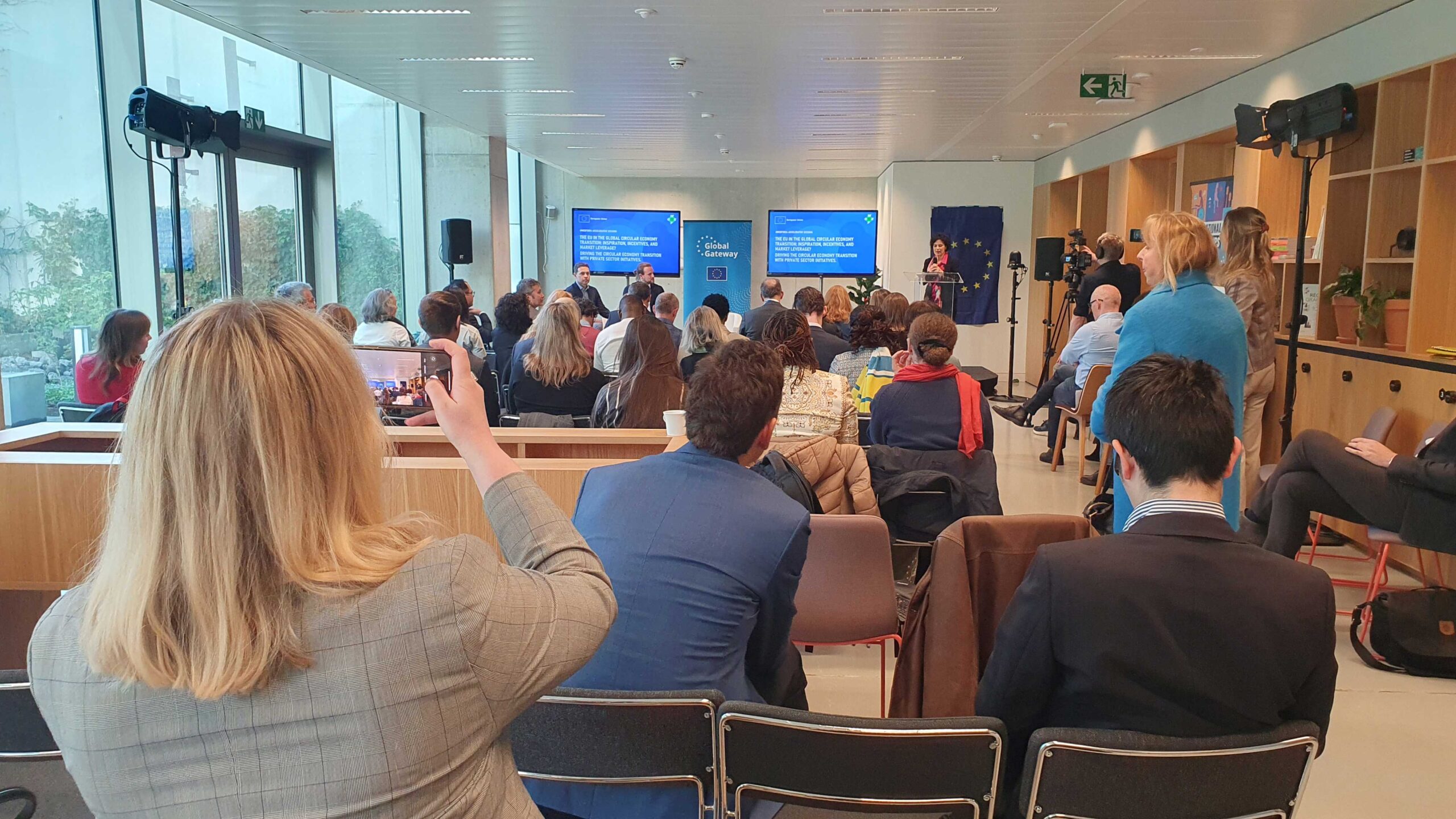Are EU initiatives towards a circular economy transition a source of inspiration, paving the way for innovative policies, business and market practices, while bolstering competitiveness? Or do they risk creating barriers for market access or global trade? These were the underlying questions for the Accelerator Session hosted by the European Commission and partners. And answers were surprising….
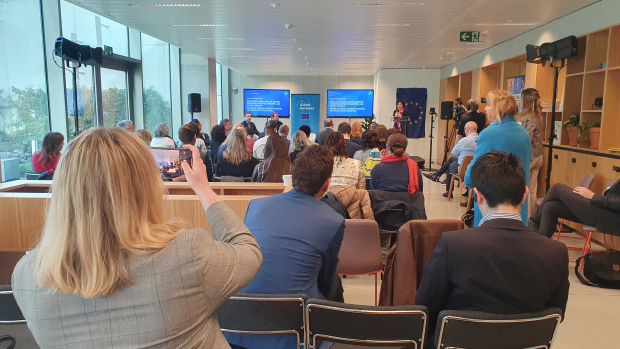
Carla Montesi, Director Green Deal and Digital Agenda in the Directorate General International Partnerships opened the event by reflecting on key messages from the first days of the World Circular Economy Forum:
- Now is time for implementation: Implementing circularity is crucial for securing economic prosperity and unlocking well-being by reducing the overuse of non-renewable natural resources.
- There is no single recipe for circular economy transitions, as the latter depend on context (no ‘one-size-fits-all’ solutions): The forum called for countries and continents to define their own circular economy narratives and prioritize collaboration.
- Collaboration is key for accelerating the transition: Radical collaboration across the globe will be fundamental in driving the transition at the speed and scale necessary.
She emphasised the EU’s commitment to international cooperation on circular economy, aligned with the European Green Deal’s emphasis on global responses to climate change and environmental challenges. The EU aims to set an ambitious agenda and collaborate with partners to advance circularity. Carla Montesi concluded by expressing gratitude for the commitment to advancing the circular economy agenda and calls for continued collaboration to make circular economy practices the norm. Mathieu Bousquet, Director, Thematic Support, Coordination of Policy & Financial Instruments, European Commission DG Neighbourhood & Enlargement Negotiations added opening remarks. Matthieu stressed that to drive the circular change we seek, we need partnerships and alliances and learning from the experiences of circular practitioners.
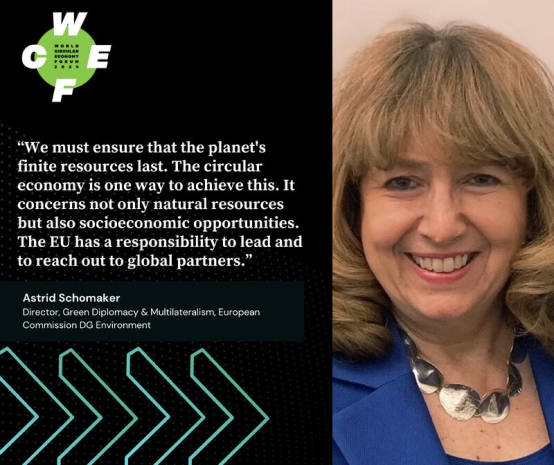
Policy provides the path
The session started with an input from Ms Astrid Schomaker, Director Green Diplomacy & Multilateralism in the Directorate General Environment. She emphasized the urgency of this transition, which must be global and involve all stakeholders. Overconsumption is a key driver of environmental crises, making the shift to a circular economy model more urgent. The EU increases circularity particularly through product policy. The Sustainable Products Regulation (ESPR) is a key legislative instrument to promote sustainability in production and consumption. Astrid Schomaker emphasised the implementation of sector-specific rules and digital product passports to enable informed consumer choices and facilitate recycling. The EU gives specific attention to textiles and plastics as priority areas for intervention, aiming to extend product lifespan, promote recycling, and reduce single-use plastics. She stressed the importance of managing waste as a valuable resource, along with the need for global collaboration and advocacy to advance the circular economy agenda. The European Union’s engagement with international partners and efforts to promote global dialogue, including advocating for a conference on Sustainable Development Goal 12 (SDG 12) on sustainable consumption and production, are highlighted as part of broader efforts to establish global rules and agreements for circularity.
Voices of policy makers and private sector actors from different regions
A panel discussed the EU path towards a circular economy. Dilshod Sharifi, Head of the International Economic Department, Ministry of Economic Development and Trade, Tajikistan acknowledges the European Union’s expertise in circular economy, which serves as inspiration for Tajikistan’s future development in this area.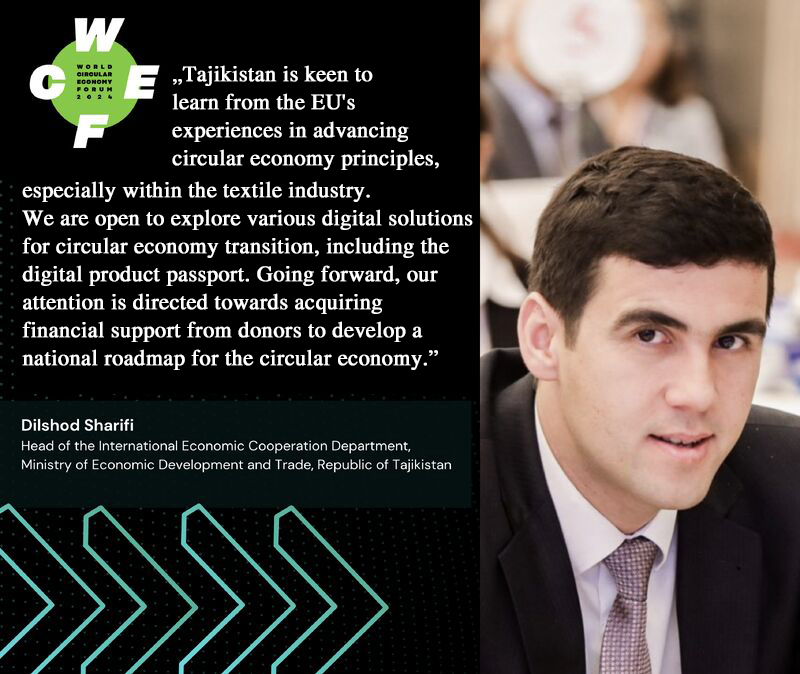 He shared about Tajikistan’s ambition on integrating circular economy principles into national legislation and development strategies. With support of the United Nations Development Account Project “Accelerating transition towards a circular economy in UNECE region”, Tajikistan initiated work on circular economy in garment and footwear sector. Tajikistan aims to develop traceability mechanisms to enhance sustainability and circularity throughout the value chain, and aims to acquire financial support from donors. He expressed interest in assessing opportunities for adapting successful EU policies to Tajikistan’s situation. Additionally, he shared about importance of regional collaboration and establishment of common framework to standardize regulations and promote cooperation, emphasizing the importance of platforms like UNECE Circular STEP Stakeholder Engagement Platform and the European Circular Economy Stakeholder Platform in facilitating collaboration.
He shared about Tajikistan’s ambition on integrating circular economy principles into national legislation and development strategies. With support of the United Nations Development Account Project “Accelerating transition towards a circular economy in UNECE region”, Tajikistan initiated work on circular economy in garment and footwear sector. Tajikistan aims to develop traceability mechanisms to enhance sustainability and circularity throughout the value chain, and aims to acquire financial support from donors. He expressed interest in assessing opportunities for adapting successful EU policies to Tajikistan’s situation. Additionally, he shared about importance of regional collaboration and establishment of common framework to standardize regulations and promote cooperation, emphasizing the importance of platforms like UNECE Circular STEP Stakeholder Engagement Platform and the European Circular Economy Stakeholder Platform in facilitating collaboration.
Leah Wananbwa Naess, Senior Policy officer at the African Union Commission shared that at the continental level there is a strong determination to address water issues and support marine biodiversity. Implementing these plans can be challenging, however, when economic benefits are clear, there is a strong incentive.
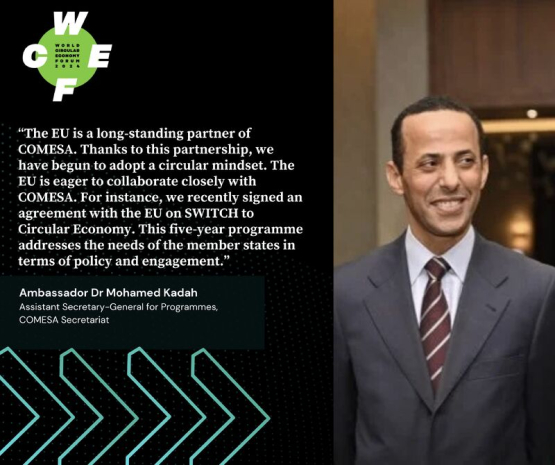
Ambassador Dr Mohamed Kadah, Assistant Secretary-General for Programmes, COMESA Secretariat, discussed the organisation’s partnership with the European Union (EU) and its journey towards circularity. He acknowledged the EU’s influence as an inspiration for circularity in COMESA. He recognised the benefits a circular economy brings, such as improving efficiencies, saving costs, and creating new opportunities for economic growth and job creation. The Assistant Secretary-General for Programmes, COMESA Secretariat noted concerns about costs and conditionality but appreciated the EU’s willingness to collaborate and support implementation efforts. He mentions a recent €40 million agreement between COMESA and the EU to promote circular economy initiatives, focusing on policy frameworks, workforce participation, and financing for circular businesses. He hopes that this program will positively impact poverty reduction and address economic difficulties within COMESA member states, with a particular emphasis on sectors like plastics, electronics, textiles, and potentially food waste.
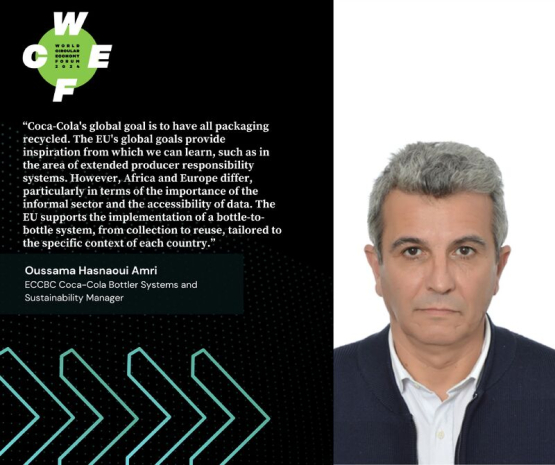
Mr Oussama Hasnaoui Amri, Systems and Sustainability Manager at ECCBC (Equatorial Coca-Cola Bottling company in North and West Africa, highlighted the importance of making all packaging recyclable, collecting 100% of packaging, and using recycled content. He compared his company goals to EU regulations, noting the EU’s role as an enabler for fast implementation. Oussama Hasnaoui Amri discussed the significance of Extended Producer Responsibility (EPR) and the circular economy, noting the informal collection system in many countries. He emphasised the need to include the informal sector in value chains as also supported under the SWITCH to Circular Economy Value Chain project co-funded by the EU and Finnish government. The project supports testing a bottle-to-bottle recycling scheme. Oussuma shared the challenges the project faces such as legal restrictions on recycled plastic use in food contact and lack of data. Overall, he sees EU support as crucial for fast progress in addressing environmental challenges.
Guy Janaway, European Commission DG International Partnership Desk for Japan and SWITCH-Asia noted that the transition to a circular economy transition is become increasingly important for Asian countries. It’s the region that has the biggest population in the world. It’s the hub for a lot of factories in terms of textile and manufacturing. Governments and business introducing national circular economy policies and strategies. However, the circular economy means different things to different people, and its important to find common ground. Guy highlighted the EU funded Switch-Asia programme is gathering business cases in ASEAN to help build this common understanding.
Matthias Reusing said that the EU serves as a global source of inspiration for the circular economy. Self-reflective, he added, that we should draw inspiration from the past: our parents and grandparents practiced circular habits. As First Counsellor at the EU Delegation to Zambia, he is hopeful that Africa will leapfrog directly into a circular economy. EU support to the upcoming SWITCH to Circular Economy in Southers and Eastern Africa can contribute to accelerating the transition.
Supporting the circular economy transition is a multi-faceted process engaging several actors across the full spectrum of economic sectors, thus requiring the mobilisation of a wide range of support.
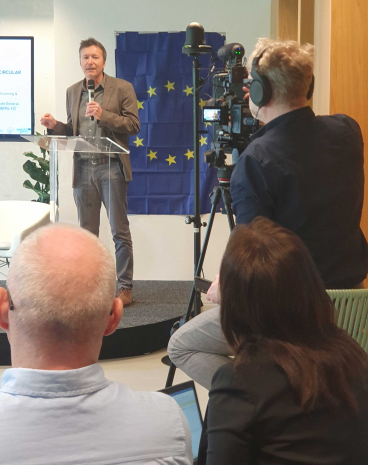
Bernard Crabbé, Team Leader, environment mainstreaming & circular economy at DG International Partnership, highlighted DG INTPA’s strategic approach to accelerate the Circular Economy transition. In line with the Circular Economy Action Plan, the strategy consists of four pillars: policy (policy first approach) – private sector support – access to finance – and civil society support. DG INTPA addresses these target groups on multiple levels: global, regional, country. All levels are also linked with the EFSD+/blending agenda.
The session closed by showcasing EU supported interventions that contribute to accelerating the circular transition. The included:
- SWITCH-Asia project Effective waste management and sustainable development of the MSME tanning companies in the Kolkata Leather Cluster
- Enhancing transparency and traceability for more sustainable value chains in the garment and footwear industry
- AL Invest Verde
- Green Economy Coalition
- Green Growth Knowledge Partnership
- UN Partnership for Action on the Green Economy
The session was organised by the European Commission Directorates General for International Partnerships, co-organised by the EU SWITCH-Asia Programme, the United Nations Economic Commission for Europe, the Green Growth Knowledge Platform, and the Partnership for Action on the Green Economy with support of the SWITCH to Green Facility.
This event was an accelerator session at the World Circular Economy Forum 2024 (www.WCEF2024.com). WCEF2024 was guided by the latest scientific evidence on the most impactful circular solutions and explores how to turn them from theory to action.
